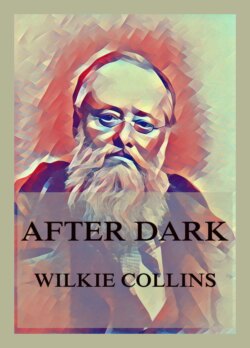After Dark

Реклама. ООО «ЛитРес», ИНН: 7719571260.
Оглавление
Wilkie Collins. After Dark
CONTENTS:
PREFACE TO “AFTER DARK.”
AFTER DARK
PROLOGUE TO THE FIRST STORY
THE TRAVELER’S STORY OF A TERRIBLY STRANGE BED
PROLOGUE TO THE SECOND STORY
THE LAWYER’S STORY OF A STOLEN LETTER
PROLOGUE TO THE THIRD STORY
THE FRENCH GOVERNESS’S STORY OF SISTER ROSE. PART FIRST. CHAPTER I
CHAPTER II
PART SECOND. CHAPTER I
CHAPTER II
CHAPTER III
CHAPTER IV
CHAPTER V
PART THIRD. CHAPTER 1
CHAPTER II
CHAPTER III
EPILOGUE TO THE THIRD STORY
PROLOGUE TO THE FOURTH STORY
THE ANGLER’S STORY OF THE LADY OF GLENWITH GRANGE
PROLOGUE TO THE FIFTH STORY
THE NUN’S STORY OF GABRIEL’S MARRIAGE. CHAPTER I
CHAPTER II
CHAPTER III
CHAPTER IV
CHAPTER V
PROLOGUE TO THE SIXTH STORY
THE PROFESSOR’S STORY OF THE YELLOW MASK. PART FIRST. CHAPTER I
CHAPTER II
CHAPTER III
PART SECOND. CHAPTER I
CHAPTER II
CHAPTER III
PART THIRD. CHAPTER I
CHAPTER II
CHAPTER III
CHAPTER IV
CHAPTER V
CHAPTER VI
CHAPTER VII
CHAPTER VIII
Отрывок из книги
After Dark
WILKIE COLLINS
.....
“Now, William, listen patiently to me,” I said. “An artist lies under this great disadvantage in case of accidents—his talents are of no service to him unless he can use his eyes and fingers. An author, on the other hand, can turn his talents to account just as well by means of other people’s eyes and fingers as by means of his own. In your present situation, therefore, you have nothing for it, as I said before, but to turn author. Wait! and hear me out. The book I want you to make is a book of all your stories. You shall repeat them, and I will write them down from your dictation. Our manuscript shall be printed; we will sell the book to the public, and so support ourselves honorably in adversity, by doing the best we can to interest and amuse others.”
While I was saying all this—I suppose in a very excitable manner—my husband looked, as our young sailor-friend would phrase it, quite taken aback. “You were always quick at contriving, Leah,” he said; “but how in the world came you to think of this plan?”
.....